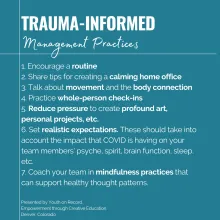
Caring for Your Team During Coronavirus: A Trauma-Informed Approach
I was about five days into working from home when I noticed something very odd. I couldn’t, for the life of me, retain information from phone calls and meetings I had earlier that day. My mind was an alphabet soup of jumbled, noodled thoughts that were getting grainier as the day went on.
“What is wrong with me?” I asked our Director of Programs, Brent Adams, later that evening on a phone call.
“Trauma-brain” he replied. And he was right. Why didn’t I think of that? Oh – right, noodle thoughts.
I know that trauma impacts the pre-frontal cortex and hippocampus of the brain, and therefore impacts memory and future planning. I know this because Brent has been training the Youth on Record team in a trauma-informed approach to education. In the simplest term, this means we approach our students with an understanding that they likely have experienced some sort of trauma, and that the traumatic experience has impacted their ability to learn in a traditional classroom.
We take many approaches to mitigate the impact that trauma has on our students’ ability to learn, including creating soothing classroom environments (we teach in the round, make sure that lighting and sounds are soothing and comforting, use affirmative language and tone). We also teach students to recognize when they are having a trauma response and provide them strategies that help them to cope and self-regulate. Once they recognize that their trauma is triggered, these strategies help them regain their focus, thereby supporting their continued learning. Ultimately, we teach our students tools so they can have more agency over their own bodies, minds, and behaviors.
Now that we’re all experiencing some kind of stress and/or trauma due to the global coronavirus pandemic, Youth on Record is more committed than ever to apply our trauma-informed lens to the adult Teaching Artists, Partner Artists, musicians, and administrators who work for our organization.

We’ve narrowed our approach down to seven basic techniques. If you are struggling, like we initially were, to support your team and still get quality work done, perhaps a few of these tips might support you as you navigate these uncertain times.
- Encourage a routine: As appealing as working in your pajamas was in the beginning of stay-at-home orders, being disconnected from a routine can cause additional anxiety, depression, and an overall feeling of malaise. We encourage our team to maintain a regular sleep schedule, to “get ready” for work each morning, to take meal breaks and afternoon walks, and to take weekends off. Maintaining some sense of normalcy helps with an overall feeling of agency in our lives.
- Share tips for creating a calming home office: Your bed is not your office. Searching for your laptop under a pile of laundry is not ideal. Keeping the blinds shut can make you feel more isolated and disconnected. We encourage our team to have a designated place for work – with natural light, good music to work to, favorite art and pictures on the walls, a comfy chair, an organized desk or surface, etc. Calm and soothing space helps to focus the mind.
- Talk about movement and the body connection: On our weekly team calls, we share our body movement practices with each other, and encourage moving the body every day. We’re dancing, walking, practicing yoga and martial arts. You name it, we’re trying it.
- Practice whole-person check-ins: Your team members are whole people who are trying to work in the midst of a global emergency. This means that their personal lives and professional lives are 100% merged. We start each check-in with a personal check-in (how are you feeling, what’s bringing you joy, what’s bringing you down, how’s your family, etc.). We’ve doubled down on the emotional lives of our team. And it’s helping.

- Reduce pressure to create profound art, personal projects, etc.: If you’re working with artists, they’re feeling a lot of external pressure to create. And non-artists are kicking themselves for not refinishing their cabinets, organizing their closets, building new bookshelves, etc. Creativity is helpful right now – but so is easing up on the pressure to be productive in our “free time.” Encourage your team to spend their downtime in ways that are nourishing to them. Assure them that they don’t have to produce anything right now. They simply need to care for themselves and the people around them.
- Set realistic expectations: That strategic plan you were all working on? It’s changed. Let it change. And know that your team’s level of productivity has changed as well. It’s ok to ease-up a bit and work in partnership with team members to set realistic – not ambitious – expectations at work.

- Coach your team in mindfulness practices that can support healthy thought patterns: We practice sharing tools and techniques that ease the obsessive and over-active mind – and we’ve learned so much from each other. Encouraging team members to share breathing exercises, meditations, affirmations, etc. is a great way to build trust and unity, while providing practices that can benefit all of us. Remember, this is a marathon. Double down on your people. Invest in their emotional and physical health. Now is the moment to build more trust, more compassion, more friendship, and a stronger community.
Oh, and for those who are managing teams. Steps 1 – 7 apply to you too! Take care of yourself. Ease-up. You have a lot of responsibility right now. But you are also a whole person who is not immune from the traumatic impacts of the pandemic. Be well. Much love.


